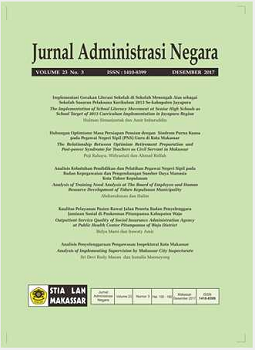TAXPAYER VOLUNTARY COMPLIANCE IN TAX AMNESTY IMPLEMENTATION IN KANTOR PELAYANAN PAJAK (KPP) PRATAMA MAKASSAR UTARA
DOI:
https://doi.org/10.33509/jan.v24i2.78Keywords:
Voluntary Complience, Implementation, Tax AmnestyAbstract
To maintain and increase the national income from taxes, special measures or policy breakthroughs are required in order to increase tax revenues in subsequent years and achieve acceptance targets. One of the efforts implemented is the Tax Amendment (Tax Amnesty). From the three phases of tax amnesty held at Kantor Pelayanan Pajak (KPP) Pratama Makassar Utara, it’s known that the taxpayer are quite enthusiastic to follow this program. The high enthusiasm of the taxpayers is a from of voluntary taxpayer compliance implementation. This review is conduct by the researcher on the key elements that are considered capable of realizing voluntary taxpayer complience which include : (1) Good service program to taxpayer, (2) Simple and easy procedure of taxpayer, (3) Complience monitoring program and effective verification, and (4) Enforcement of law enforcement explicitly and fairly. The research method use is descriptive with qualitative approach. Techniques of collecting data is done in depth interviews, observation, and document review. The result show that taxpayer voluntary complience in the implementation of tax amnesty at Kantor Pelayanan Pajak (KPP) Pratama Makassar Utara is effective eve though the target for tax amnesty is not set in the regional scale but centralized (national scale).
Downloads
Downloads
Published
How to Cite
Issue
Section
License
Policy for Journals That Offer Open Access
Authors who publish with this journal agree to the following terms:
- Authors retain copyright and grant the journal right of first publication with the work simultaneously licensed under a Creative Commons Attribution-NonCommercial-ShareAlike 4.0 International License that allows others to share the work with an acknowledgement of the work's authorship and initial publication in this journal.
- Authors are able to enter into separate, additional contractual arrangements for the non-exclusive distribution of the journal's published version of the work (e.g., post it to an institutional repository or publish it in a book), with an acknowledgement of its initial publication in this journal.
- Authors are permitted and encouraged to post their work online (e.g., in institutional repositories or on their website) prior to and during the submission process, as it can lead to productive exchanges, as well as earlier and greater citation of published work (See The Effect of Open Access).







